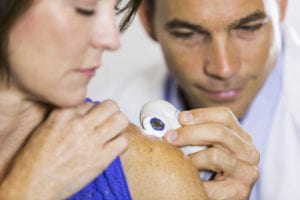You Know, but do they? Why Non-Melanoma Skin Cancer should be Removed
- Posted on: Jun 15 2017
- Leave a response
 There is an interesting thing that happens with some patients when they are faced with a skin cancer diagnosis, especially one that was not expected: denial. Dermatologists often hear questions from their patients wondering if a growth needs to be removed. This may be a visible growth on the face that is still small and leaves a patient more worried about scarring than the extensive ramifications of skin cancer. Conversely, cancerous growths in hidden places may also seem like “no big deal.” Why not just wait and see what happens? Here’s why . . .
There is an interesting thing that happens with some patients when they are faced with a skin cancer diagnosis, especially one that was not expected: denial. Dermatologists often hear questions from their patients wondering if a growth needs to be removed. This may be a visible growth on the face that is still small and leaves a patient more worried about scarring than the extensive ramifications of skin cancer. Conversely, cancerous growths in hidden places may also seem like “no big deal.” Why not just wait and see what happens? Here’s why . . .
Most people are well aware that a melanoma skin cancer is one that they want to have treated as soon as possible. The risk to life is not questioned; it has been proven and need provide no further evidence of its serious nature. When it comes to non-melanoma skin cancers, a bit of confusion still exists. This is demonstrated by the very question by a patient to hold off on that excision.
Are basal cell and squamous cell carcinoma as serious as melanoma? No. These skin cancers rarely metastasize or threaten life. In many cases, they appear to stop growing for years at a time. Does this mean that a basal cell carcinoma or squamous cell carcinoma can wait until they pose an obvious cosmetic problem? Of course not.
Basal cell and squamous cell carcinomas are not nearly as innocuous as they may seem. These growths, while they appear “normal” on the outside, are quite likely becoming invasive below the surface. Eventually, this invasiveness will be unmistakable, making itself known through erosion of tissue or other unpleasant effects. The longer that treatment waits, the more extensive disfigurement may be. Patients need to be able to make the correlation between waiting and the increased difficulty of treatment without the need for substantial reconstruction.
Early detection and treatment are ideal for all forms of skin cancer, even those who do not present the risk of metastasis and death. Non-melanoma skin cancers kindly provide early warning signs; it is up to healthcare providers to educate patients about these indicators, and the need to address them earlier rather than later.
Treatment for skin cancer has become more sophisticated than ever due to the development and refinement of Mohs micrographic surgery. Learn more about this technique and why it is integral to optimal patient outcomes. Contact us for more information on our organization and upcoming courses.
Posted in: Skin Cancer


